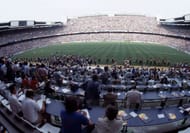
Football is a sport with a passionate and an unparalleled fanfare. It is their passion for the game that motivates players and fans alike. But what is more crucial?
In any sport, venues are very significant. Football stadiums are the generators of enthusiasm and landmarks of memory.
The biggest extravaganza in the history of any sport is the FIFA World Cup. Several stadiums across the globe had the honour of hosting World Cup fixtures.
Among these, some of the stadiums are termed as iconic stadiums either due to their infrastructure or world record attendances or even it may be due to eye-catching and memorable matches held in these stadiums.
The 21st World Cup is scheduled to take place in Russia from 14 June to 15 July. The champions of this edition will be decided at Luzhniki Stadium. With a few days remaining for the 2018 FIFA World Cup, we take a look at the some of the iconic stadiums to have hosted the legendary matches.
#5 Estadio Azteca (Mexico City, Mexico)

Inauguration: 1966 | Capacity: 87,523
Since its inception, Estadio Azteca is the national stadium for the football team of Mexico. With an official capacity of 87,000, it is the largest stadium in the country.
The architects of the Estadio Azteca were Pedro Ramirez and Rafael Mijares. The stadium was complete in 1966 and the first match was played between Club America and Torino FC with 107,494 spectators watching the match.
The stadium has witnessed the many historical events of football. Among those, the "Hand of God" by Maradona in 1986 World Cup or "Game of the Century" in the 1970 World Cup where Italy defeated West Germany 4-3 in extra time are the most familiar ones.
Also, the stadium has engraved its name in books of history as the legends of football Pele and Diego Maradona lifted the World Cup trophy at this venue.
The stadium hosted the 1970 World Cup final where Brazil defeated Azzurri's by a margin of 4-1. More than 114,000 spectated the 1986 World Cup finals.
#4 Signal Iduna Park (Dortmund, Germany)

Opening: 1974 | Capacity: 81,360
Commonly known as Westfalenstadion, Signal Iduna Park is the home of the yellow army, Borussia Dortmund. It is the seventh largest stadium in Europe having a capacity of 81,360 for domestic games.
The most massive fan terrace, South Bank can accommodate 24,454 fans, is also known as the "Yellow Wall" due to the electrifying atmosphere created by Dortmund fans.
Signal Iduna Park has hosted the 1974 and 2006 FIFA World Cup games. In total, it has hosted 10 FIFA World Cup matches. The stadium has witnessed both famous and shocking events.
Trinidad and Tobago made their debut in the FIFA World Cup against Sweden here but the most shocking game saw the Germans crashing to their first ever defeat at this stadium in semi-finals against Italy.
#3) Santiago Bernabeu (Madrid, Spain)

Inauguration: 1947 | Capacity: 81,044
Santiago Bernabeu is the home for the national football team of Spain. It is also the home for the Spanish footballing giants Real Madrid.
Named after chairman Santiago Bernabeu Yeste, Santiago Bernabeu has hosted 4 European Cup finals in four different decades (1957, 1969, 1980, and 2010). It is the first stadium in Europe to host both a UEFA European Championship and a FIFA World Cup final.
The stadium has also had the privilege to host the final in 1982. In the final, West Germany faced former champions Italy. After a quiet first half, Antonio Cabrini opened the scoring for Italy. Marco Tardelli and Alessandro Altobelli then increased the lead to 3-0.
Although West Germany showed signs of a fightback by scoring in the 83rd minute, Italy held their nerves to clinch the title.
#2) Estadio Centenario (Montevideo, Uruguay)

Inauguration: 1930 | Capacity: 78,838
Estadio Centenario was built in 1929 and 1930 to host the first ever World Cup in the history of football. The stadium was built in a record time of 9 months.
In the dramatic 1930 World Cup final, Uruguay came back strongly and turned the1-2 deficit to win 4-2 against Argentina to send 93,000 spectators into a frenzy. Other than the 1930 World Cup final, Estadio Centenario has hosted four Copa America finals in four different decades (1942, 1956, 1967, 1995).
Estadio Centenario has got many accolades too. On 18 July 1983, FIFA declared the stadium as "the only historical monument of World Football, the only building of its kind." The first FIFA president, Julies Rimet called the stadium as "the temple of football."
Uruguay are a strong team at home. One of the strongest teams, Brazil, have emerged victorious only thrice in 20 games played at this venue.
#1) Maracana Stadium (Rio de Janiero, Brazil)

Inauguration: 1950 | Capacity: 78,838
Estádio Jornalista Mário Filho is commonly known as Maracana stadium and has hosted two World Cups, in 1950 and 2014.
The stadium was built just before the start of the 1950 World Cup. In 1950, the champion of the World Cup was decided using a round-robin league. Brazil topped the table before facing Uruguay in the final match.
Brazil just required a draw to win the World Cup. Brazilians were 1-0 up at half-time but Uruguay managed to mount a comeback and defeated the hosts to win the World Cup.
Till date, Brazilians remember it as "Maracanzo" or "The Maracana blow."
Also read: Iconic World Cup Moments - When Uruguay silenced the Maracana
After renovation in 2013, it once again hosted the World Cup final. Germany defeated Argentina by a solitary goal in extra time to lift the World Cup. The Maracana stadium joins Estadio Azteca in Mexico as the only two stadiums to host the final of a World Cup twice.
